人教版(2019)必修 第三册Unit 4 Space Exploration复习课件(共47张ppt)
文档属性
| 名称 | 人教版(2019)必修 第三册Unit 4 Space Exploration复习课件(共47张ppt) |  | |
| 格式 | pptx | ||
| 文件大小 | 2.9MB | ||
| 资源类型 | 教案 | ||
| 版本资源 | 人教版(2019) | ||
| 科目 | 英语 | ||
| 更新时间 | 2023-01-11 16:05:25 | ||
图片预览


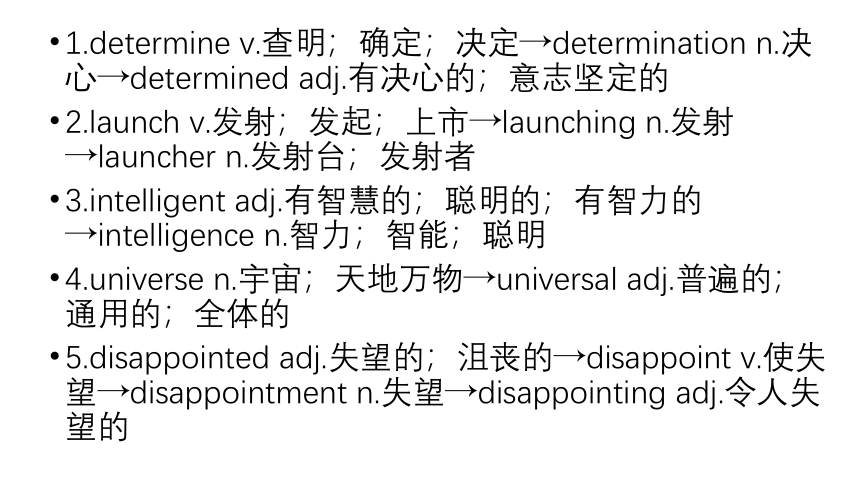
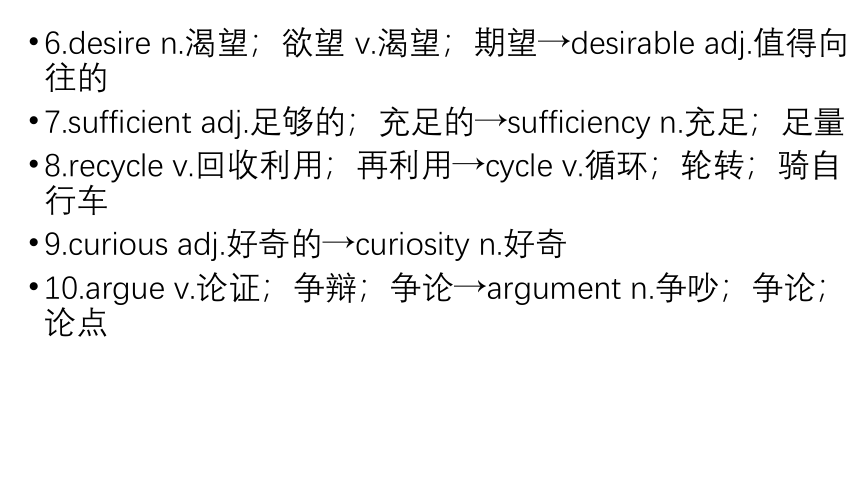
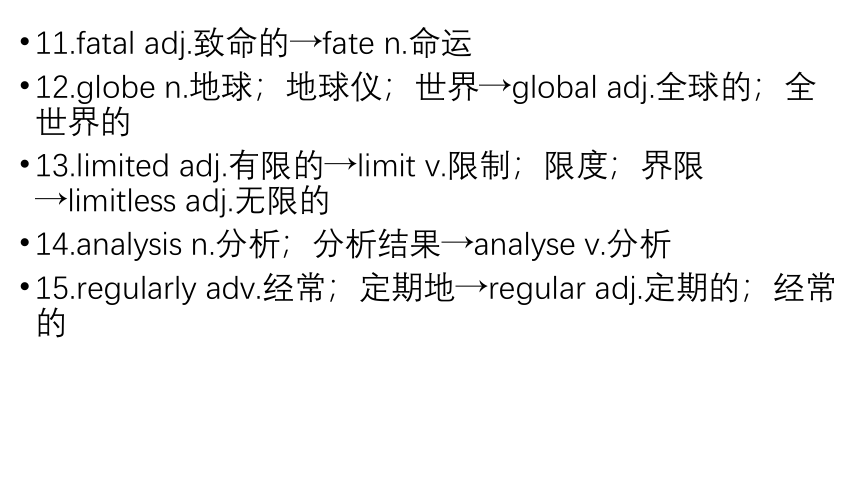
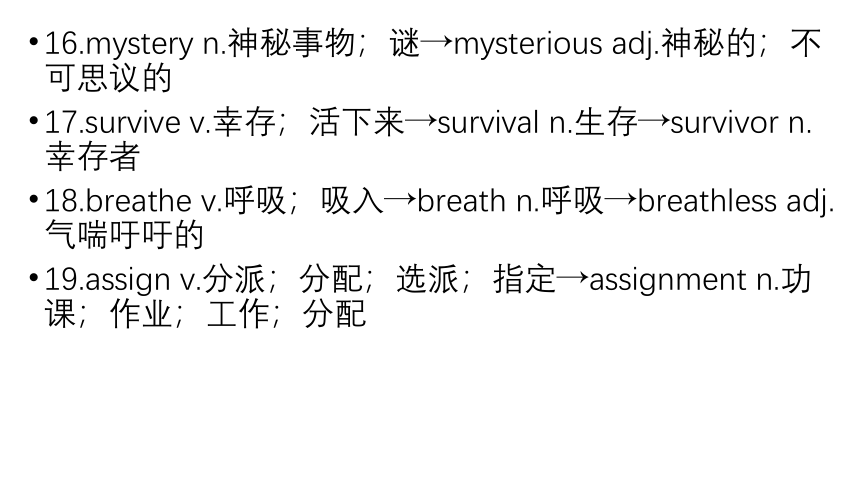

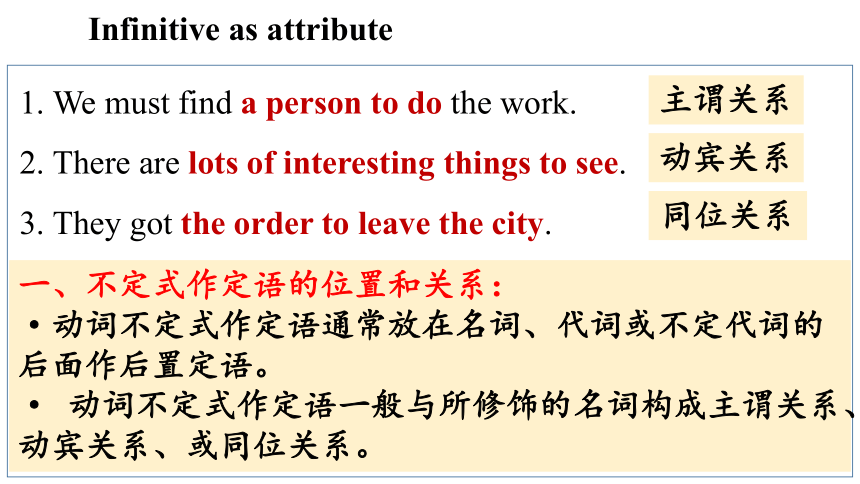
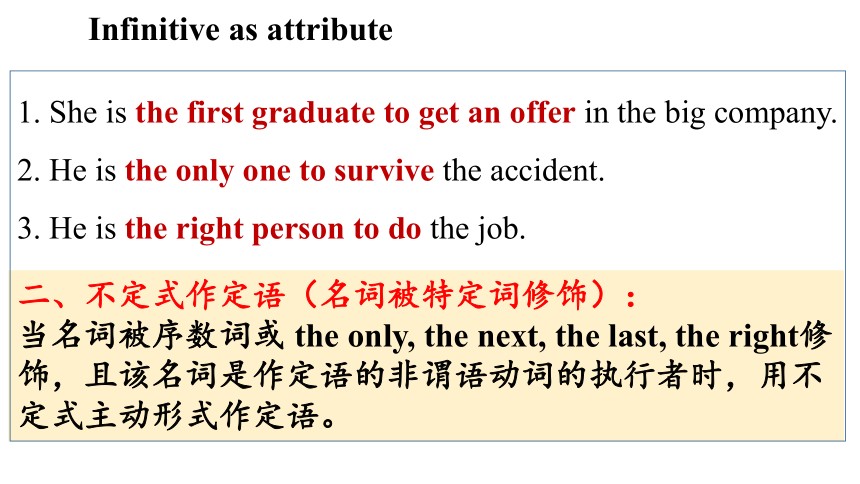
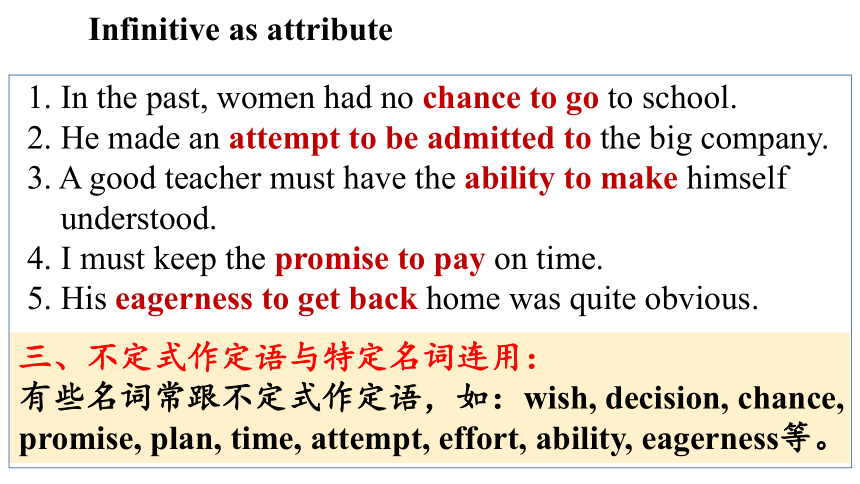
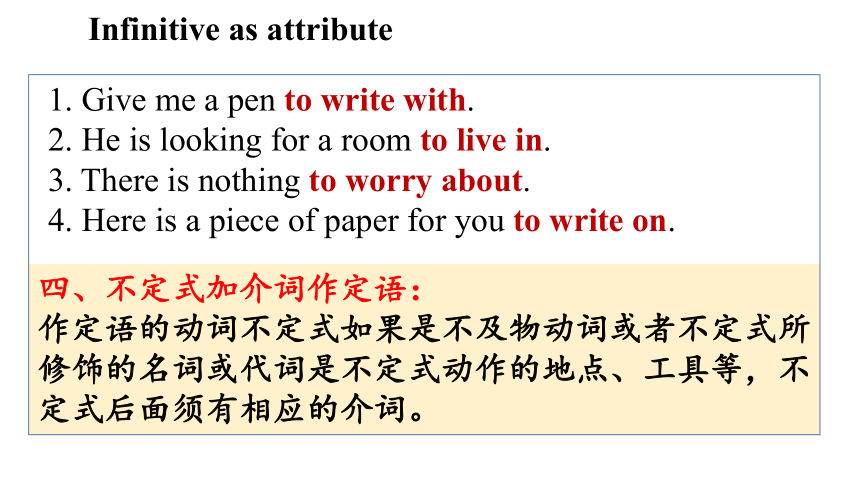
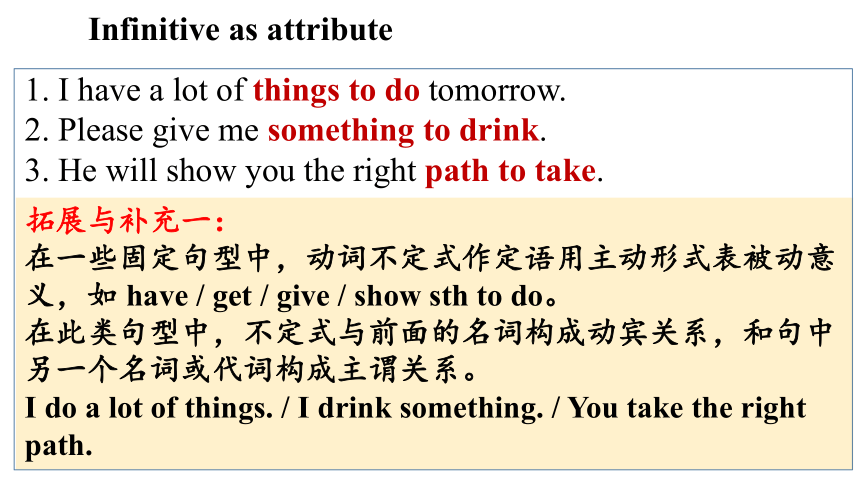
文档简介
(共47张PPT)
必修第三册Unit 4
单词
1.determine v.查明;确定;决定→determination n.决心→determined adj.有决心的;意志坚定的
2.launch v.发射;发起;上市→launching n.发射→launcher n.发射台;发射者
3.intelligent adj.有智慧的;聪明的;有智力的→intelligence n.智力;智能;聪明
4.universe n.宇宙;天地万物→universal adj.普遍的;通用的;全体的
5.disappointed adj.失望的;沮丧的→disappoint v.使失望→disappointment n.失望→disappointing adj.令人失望的
6.desire n.渴望;欲望 v.渴望;期望→desirable adj.值得向往的
7.sufficient adj.足够的;充足的→sufficiency n.充足;足量
8.recycle v.回收利用;再利用→cycle v.循环;轮转;骑自行车
9.curious adj.好奇的→curiosity n.好奇
10.argue v.论证;争辩;争论→argument n.争吵;争论;论点
11.fatal adj.致命的→fate n.命运
12.globe n.地球;地球仪;世界→global adj.全球的;全世界的
13.limited adj.有限的→limit v.限制;限度;界限→limitless adj.无限的
14.analysis n.分析;分析结果→analyse v.分析
15.regularly adv.经常;定期地→regular adj.定期的;经常的
16.mystery n.神秘事物;谜→mysterious adj.神秘的;不可思议的
17.survive v.幸存;活下来→survival n.生存→survivor n.幸存者
18.breathe v.呼吸;吸入→breath n.呼吸→breathless adj.气喘吁吁的
19.assign v.分派;分配;选派;指定→assignment n.功课;作业;工作;分配
语法
1. We must find a person to do the work.
2. There are lots of interesting things to see.
3. They got the order to leave the city.
一、不定式作定语的位置和关系:
·动词不定式作定语通常放在名词、代词或不定代词的后面作后置定语。
· 动词不定式作定语一般与所修饰的名词构成主谓关系、动宾关系、或同位关系。
主谓关系
动宾关系
同位关系
Infinitive as attribute
1. She is the first graduate to get an offer in the big company.
2. He is the only one to survive the accident.
3. He is the right person to do the job.
二、不定式作定语(名词被特定词修饰):
当名词被序数词或 the only, the next, the last, the right修饰,且该名词是作定语的非谓语动词的执行者时,用不定式主动形式作定语。
Infinitive as attribute
1. In the past, women had no chance to go to school.
2. He made an attempt to be admitted to the big company.
3. A good teacher must have the ability to make himself
understood.
4. I must keep the promise to pay on time.
5. His eagerness to get back home was quite obvious.
三、不定式作定语与特定名词连用:
有些名词常跟不定式作定语,如:wish, decision, chance, promise, plan, time, attempt, effort, ability, eagerness等。
Infinitive as attribute
1. Give me a pen to write with.
2. He is looking for a room to live in.
3. There is nothing to worry about.
4. Here is a piece of paper for you to write on.
四、不定式加介词作定语:
作定语的动词不定式如果是不及物动词或者不定式所修饰的名词或代词是不定式动作的地点、工具等,不定式后面须有相应的介词。
Infinitive as attribute
1. I have a lot of things to do tomorrow.
2. Please give me something to drink.
3. He will show you the right path to take.
拓展与补充一:
在一些固定句型中,动词不定式作定语用主动形式表被动意义,如 have / get / give / show sth to do。
在此类句型中,不定式与前面的名词构成动宾关系,和句中另一个名词或代词构成主谓关系。
I do a lot of things. / I drink something. / You take the right path.
Infinitive as attribute
1. Do you have any clothes to wash
2. Kids, do you have any clothes to be washed
3. I can’t go out this afternoon, because I have many
materials to type.
4. The boss told me that he had many materials to be typed.
试比较1、2句和3、4句的区别是什么?
Infinitive as attribute
当不定式与前面的名词构成动宾关系,且和句中的主语构成逻辑上的主谓关系时,用主动形式表被动意义;若没有逻辑上的主谓关系且不确定逻辑主语是谁时,仍用被动语态。
1. There is a lot of homework to do.
2. There is a lot of homework to be done.
3. There is nothing to see.
4. There is nothing to be seen.
拓展与补充二:
Infinitive as attribute
在there be + n + to do 结构中,可用不定式的主动形式也可用被动形式,只是意义和侧重点不同,to do强调人,其逻辑主语是动作的发出者,to be done强调物,其逻辑主语是动作的承受者。
主动语态 被动语态
一般式 to do to be done
进行式 to be doing
完成式 to have done to have been done
完成进行式 to have been doing
动词不定式的时态和语态
Infinitive as attribute: Summary
1. We must find a person to do the work.
2. There are lots of interesting things to see.
3. They got the order to leave the city.
一、不定式作定语的位置和关系:
·动词不定式作定语通常放在名词、代词或不定代词的后面作后置定语。
· 动词不定式作定语一般与所修饰的名词构成主谓关系、动宾关系、或同位关系。
主谓关系
动宾关系
同位关系
Infinitive as attribute
1. She is the first graduate to get an offer in the big company.
2. He is the only one to survive the accident.
3. He is the right person to do the job.
二、不定式作定语(名词被特定词修饰):
当名词被序数词或 the only, the next, the last, the right修饰,且该名词是作定语的非谓语动词的执行者时,用不定式主动形式作定语。
Infinitive as attribute
1. In the past, women had no chance to go to school.
2. He made an attempt to be admitted to the big company.
3. A good teacher must have the ability to make himself
understood.
4. I must keep the promise to pay on time.
5. His eagerness to get back home was quite obvious.
三、不定式作定语与特定名词连用:
有些名词常跟不定式作定语,如:wish, decision, chance, promise, plan, time, attempt, effort, ability, eagerness等。
Infinitive as attribute
1. Give me a pen to write with.
2. He is looking for a room to live in.
3. There is nothing to worry about.
4. Here is a piece of paper for you to write on.
四、不定式加介词作定语:
作定语的动词不定式如果是不及物动词或者不定式所修饰的名词或代词是不定式动作的地点、工具等,不定式后面须有相应的介词。
Infinitive as attribute
1. I have a lot of things to do tomorrow.
2. Please give me something to drink.
3. He will show you the right path to take.
拓展与补充一:
在一些固定句型中,动词不定式作定语用主动形式表被动意义,如 have / get / give / show sth to do。
在此类句型中,不定式与前面的名词构成动宾关系,和句中另一个名词或代词构成主谓关系。
I do a lot of things. / I drink something. / You take the right path.
Infinitive as attribute
1. Do you have any clothes to wash
2. Kids, do you have any clothes to be washed
3. I can’t go out this afternoon, because I have many
materials to type.
4. The boss told me that he had many materials to be typed.
试比较1、2句和3、4句的区别是什么?
Infinitive as attribute
当不定式与前面的名词构成动宾关系,且和句中的主语构成逻辑上的主谓关系时,用主动形式表被动意义;若没有逻辑上的主谓关系且不确定逻辑主语是谁时,仍用被动语态。
1. There is a lot of homework to do.
2. There is a lot of homework to be done.
3. There is nothing to see.
4. There is nothing to be seen.
拓展与补充二:
Infinitive as attribute
在there be + n + to do 结构中,可用不定式的主动形式也可用被动形式,只是意义和侧重点不同,to do强调人,其逻辑主语是动作的发出者,to be done强调物,其逻辑主语是动作的承受者。
主动语态 被动语态
一般式 to do to be done
进行式 to be doing
完成式 to have done to have been done
完成进行式 to have been doing
动词不定式的时态和语态
Infinitive as attribute: Summary
语言点
be disappointed at/with/by...对……失望
be disappointed to do sth. 对做某事失望
be disappointed that...对……失望
to one’s disappointment令某人失望的是
adj.失望的,沮丧的 (disappoint vt.使失望/沮丧disappointing adj.令人失望的 disappointment n.失望,沮丧)
1
disappointed
(1)Judging from his look,his boss was with his performance.So to his ,he didn’t get promoted.(disappoint)
disappointed
disappointed
disappointing
disappointment
(2)他对未能获奖感到极度失望,把自己锁在房间里。(读后续写之心理描写)
Overcome with ,he locked himself in the room.
(3)To their disappointment,they failed to cook a Mother’s Day breakfast at the first attempt.(2021·新高考全国Ⅰ,读后续写)
→ was that they failed to cook a Mother’s Day breakfast at the first attempt.(用what引导的主语从句改写)
→They failed to cook a Mother’s Day breakfast at the first attempt,
.(用定语从句改写)
What made them disappointed/What disappointed them
bitter disappointment at his failing to win a prize
which made them disappointed/disappointed them
have a desire to do sth. 渴望做某事
have a desire for sth. 渴望得到某物
desire to do sth. 渴望做某事
desire sb. to do sth. 渴望某人做某事
desire that...(should) do...渴望……
n.渴望;欲望;愿望 vt.渴望;期望
2
desire
(1)The boy has a strong desire a smartphone with a large internal memory to play games.
for
(2)My foreign teacher desires his son (learn) Chinese culture,so I strongly recommend Beijing Language and Culture University to him.
(3)我渴望成为像那些医生一样的人,他们为社会做出了巨大贡献。(2020·天津,书面表达)
① who have made great contributions to the society.(desire to do)
② who have made great contributions to the society.(desire that...)
I desire to become a person like those doctors
to learn
I desire that I (should) become a person like those doctors
signal (to) sb. to do sth. 示意某人做某事
signal (sb. ) that示意(某人)……
traffic signals交通信号灯
v.标志着;标明;发信号
n.信号;标志;预示;信号灯
3
signal
(1)The headteacher signaled to the monitor (manage) the students strictly.
to manage
(2)铃声响起,放学了,学生们站起来,抓起书包,像箭一样冲出教室。(读后续写之动作链描写)
The bell ,and all the students rose to their feet,seized their schoolbags and rushed out of the classroom like arrows.
(3)司机抱起受伤的男孩,把他放在车里,匆忙把他送到医院,忽视了一路上的交通信号。(读后续写之动作链描写)
The driver lifted up the injured boy,placed him in the car and rushed him to the hospital, .
signaled that school was over
ignoring the traffic signals all the way
(a) lack of缺少……
for/through lack of因缺少……
be lacking in在……方面缺乏
vt.缺乏;缺少;没有
n.缺乏;短缺 (lacking adj.不足的;缺乏的)
4
lack
(1)For lack sufficient oxygen,the astronaut could not carry on with his mission.
of
(2)健康问题与不好的饮食习惯和缺乏锻炼密切相关。(话题写作之健康生活)
Health problems are closely connected with bad eating habits and ______
.
(3)尽管这对双胞胎缺乏烹饪经验,但他们通过上网寻求建议来弥补。
(2021·新高考全国Ⅰ,读后续写)
①Though they ,the twins made up for it by turning to the Internet for some advice.
② ,the twins made up for it by turning to the Internet for some advice.(用省略句改写)
(a) lack
of exercise
lacked cooking experience
Though lacking cooking experience
argue with sb. about/over sth. 因某事与某人争吵/争论
argue for/against (doing)sth. 据理赞成/反对(做)某事
argue that...主张……,认为……
argue sb. into/out of doing sth. 说服某人做/不做某事
vt.& vi.争论;争辩;论证(argument n.争论;争辩;争吵;论点)
5
argue
(1)The reason why he had an (argue) with his wife was that their money was running out.
(2)He often argues his son recycling water so as to cut down the water bill.
(3)They argued him taking exercise on a regular basis.
(4)现在 60%的受采访者支持垃圾分类并且声称他们会在日常生活中这么做。(议论文)
Currently, and claim that they will do this in their daily life.
argument
with
about/over
into
60% of the interviewees argue for rubbish classification
attach...to...把……附在……上;把……绑在……上
attach importance/significance/value/weight/...to...认为……有重要性/
意义/价值/分量等
be attached to喜欢,依恋;附属于
v.系;绑;贴;把……固定;重视(attached adj.附加的;依恋的,爱慕的 attachment n.附件;附属品;依恋)
6
attach
(1)Please find my application letter and resume in the (attach).
attachment
(2)With time going by,Claire seemed to be more (attach) to Tony,the robot.
(3)在学习语言的过程中,你再怎么强调阅读的重要性也不为过。(应用文写作之建议信)
during the process of learning a language.
(4)他拿出吊床,拴在树上,惬意地躺在里面,听着他最喜爱的音乐。(读后续写之动作链描写)
He took out the hammock, and lay in it comfortably,listening to his favorite music.
attached
You can never attach too much importance to reading
attached it to the trees
run out of用光,用完(人作主语,有被动语态)
run across偶然遇到
run after追逐;追求
run into撞上;遇上,偶然遇到;碰上(困境、麻烦等)
用完;耗尽(物作主语,无被动语态)
7
run out
用run的相关短语填空
(1)The moment we a cute wild rabbit,we rode our horses and it without hesitation.
(2)Our energy was but when we heard the call of my uncle,a radiant smile lit up our faces.
(3)I had all my patience and I began to explode with anger.
ran across/into
ran after
running out
run out of
otherwise用作连词时,有时表示一种含蓄的虚拟条件,此时其后的句
子用虚拟语气。表示对过去的虚拟,其后句子的谓语动词用
would/could have done;表示对现在的虚拟,其后句子的谓语动词用
would/could do。
otherwise还常用于句型“祈使句+otherwise+陈述句”。
Astronauts have to use tape to stick everything down while working in space because everything would float off otherwise.宇航员在太空工作时必须用胶带把所有的东西固定下来,否则所有的东西都会飘走。
8
otherwise
的用法
(1)我们当时不知道你遇到了困难,要不然我们会帮助你的。
We didn’t know you were in trouble at that time,__________________
.
(2)我现在没带钱。否则我就借给你一些了。
I have no money on me now.Otherwise, .
(3)快点,否则我们会错过末班车。
Hurry up, .
otherwise we would
have given you a hand
I would lend some to you
otherwise/or we will miss the last bus
exploring space在句中作主语。doing作主语还有以下情况:(1)it作形式主语:It is no use/no good/useless doing sth. 做某事没用;It is a waste of time doing sth. 做某事浪费时间。(2)动名词的复合结构:名词所有格/形容词性物主代词+doing作主语。
Firstly,exploring space has already made a difference in the fight against world hunger.首先,探索太空已经在与世界饥饿的斗争中发挥了作用。
9
动名词作主语
(1)对学习有积极的态度是我尊敬你的原因。
is the reason why I respect you.
(2)在森林中迷路使我的心提到了嗓子眼。(读后续写之心理描写)
made my heart in my mouth.
(3)在我看来,玩电脑游戏是浪费时间。
In my opinion, .
(4)他考试又不及格使他很羞愧,他羞愧地低着头。
made him ashamed and he hung down his head in shame.
Having a positive attitude to study
Being lost in the forest
it is a waste of time playing computer games
His failing in the exam again
课文短语
Language points: Important phrases (P40, P41)
1 the main reasons for
2 go wrong
3 remain bright
4 in the hope of
5 find out the secrets
6 realise one’s dream
7 achieve goals
8 in space
……的主要原因
出错
仍然是光明的
怀着……的希望
找出秘密
实现某人的梦想
实现目标
在太空中
Language points: Important words and phrases (P44)
1 waste time doing sth
2 find solutions to problems
3 fatal diseases
4 result in
5 orbit Earth
6 provide recommendations for sb
7 be widely used
8 at present
浪费时间做某事
找到解决问题的方法
致命的疾病
导致
环绕地球
为某人提供建议
被广泛使用
目前
Language points: Important words and phrases (P44 ~ P45)
9 in the future
10 in closing
11 be against
12 unsolved mysteries
13 run out
14 give feedback on
15 spelling errors
将来
最后
反对
未解之谜
用完
对……作出反馈
拼写错误
谢谢大家
必修第三册Unit 4
单词
1.determine v.查明;确定;决定→determination n.决心→determined adj.有决心的;意志坚定的
2.launch v.发射;发起;上市→launching n.发射→launcher n.发射台;发射者
3.intelligent adj.有智慧的;聪明的;有智力的→intelligence n.智力;智能;聪明
4.universe n.宇宙;天地万物→universal adj.普遍的;通用的;全体的
5.disappointed adj.失望的;沮丧的→disappoint v.使失望→disappointment n.失望→disappointing adj.令人失望的
6.desire n.渴望;欲望 v.渴望;期望→desirable adj.值得向往的
7.sufficient adj.足够的;充足的→sufficiency n.充足;足量
8.recycle v.回收利用;再利用→cycle v.循环;轮转;骑自行车
9.curious adj.好奇的→curiosity n.好奇
10.argue v.论证;争辩;争论→argument n.争吵;争论;论点
11.fatal adj.致命的→fate n.命运
12.globe n.地球;地球仪;世界→global adj.全球的;全世界的
13.limited adj.有限的→limit v.限制;限度;界限→limitless adj.无限的
14.analysis n.分析;分析结果→analyse v.分析
15.regularly adv.经常;定期地→regular adj.定期的;经常的
16.mystery n.神秘事物;谜→mysterious adj.神秘的;不可思议的
17.survive v.幸存;活下来→survival n.生存→survivor n.幸存者
18.breathe v.呼吸;吸入→breath n.呼吸→breathless adj.气喘吁吁的
19.assign v.分派;分配;选派;指定→assignment n.功课;作业;工作;分配
语法
1. We must find a person to do the work.
2. There are lots of interesting things to see.
3. They got the order to leave the city.
一、不定式作定语的位置和关系:
·动词不定式作定语通常放在名词、代词或不定代词的后面作后置定语。
· 动词不定式作定语一般与所修饰的名词构成主谓关系、动宾关系、或同位关系。
主谓关系
动宾关系
同位关系
Infinitive as attribute
1. She is the first graduate to get an offer in the big company.
2. He is the only one to survive the accident.
3. He is the right person to do the job.
二、不定式作定语(名词被特定词修饰):
当名词被序数词或 the only, the next, the last, the right修饰,且该名词是作定语的非谓语动词的执行者时,用不定式主动形式作定语。
Infinitive as attribute
1. In the past, women had no chance to go to school.
2. He made an attempt to be admitted to the big company.
3. A good teacher must have the ability to make himself
understood.
4. I must keep the promise to pay on time.
5. His eagerness to get back home was quite obvious.
三、不定式作定语与特定名词连用:
有些名词常跟不定式作定语,如:wish, decision, chance, promise, plan, time, attempt, effort, ability, eagerness等。
Infinitive as attribute
1. Give me a pen to write with.
2. He is looking for a room to live in.
3. There is nothing to worry about.
4. Here is a piece of paper for you to write on.
四、不定式加介词作定语:
作定语的动词不定式如果是不及物动词或者不定式所修饰的名词或代词是不定式动作的地点、工具等,不定式后面须有相应的介词。
Infinitive as attribute
1. I have a lot of things to do tomorrow.
2. Please give me something to drink.
3. He will show you the right path to take.
拓展与补充一:
在一些固定句型中,动词不定式作定语用主动形式表被动意义,如 have / get / give / show sth to do。
在此类句型中,不定式与前面的名词构成动宾关系,和句中另一个名词或代词构成主谓关系。
I do a lot of things. / I drink something. / You take the right path.
Infinitive as attribute
1. Do you have any clothes to wash
2. Kids, do you have any clothes to be washed
3. I can’t go out this afternoon, because I have many
materials to type.
4. The boss told me that he had many materials to be typed.
试比较1、2句和3、4句的区别是什么?
Infinitive as attribute
当不定式与前面的名词构成动宾关系,且和句中的主语构成逻辑上的主谓关系时,用主动形式表被动意义;若没有逻辑上的主谓关系且不确定逻辑主语是谁时,仍用被动语态。
1. There is a lot of homework to do.
2. There is a lot of homework to be done.
3. There is nothing to see.
4. There is nothing to be seen.
拓展与补充二:
Infinitive as attribute
在there be + n + to do 结构中,可用不定式的主动形式也可用被动形式,只是意义和侧重点不同,to do强调人,其逻辑主语是动作的发出者,to be done强调物,其逻辑主语是动作的承受者。
主动语态 被动语态
一般式 to do to be done
进行式 to be doing
完成式 to have done to have been done
完成进行式 to have been doing
动词不定式的时态和语态
Infinitive as attribute: Summary
1. We must find a person to do the work.
2. There are lots of interesting things to see.
3. They got the order to leave the city.
一、不定式作定语的位置和关系:
·动词不定式作定语通常放在名词、代词或不定代词的后面作后置定语。
· 动词不定式作定语一般与所修饰的名词构成主谓关系、动宾关系、或同位关系。
主谓关系
动宾关系
同位关系
Infinitive as attribute
1. She is the first graduate to get an offer in the big company.
2. He is the only one to survive the accident.
3. He is the right person to do the job.
二、不定式作定语(名词被特定词修饰):
当名词被序数词或 the only, the next, the last, the right修饰,且该名词是作定语的非谓语动词的执行者时,用不定式主动形式作定语。
Infinitive as attribute
1. In the past, women had no chance to go to school.
2. He made an attempt to be admitted to the big company.
3. A good teacher must have the ability to make himself
understood.
4. I must keep the promise to pay on time.
5. His eagerness to get back home was quite obvious.
三、不定式作定语与特定名词连用:
有些名词常跟不定式作定语,如:wish, decision, chance, promise, plan, time, attempt, effort, ability, eagerness等。
Infinitive as attribute
1. Give me a pen to write with.
2. He is looking for a room to live in.
3. There is nothing to worry about.
4. Here is a piece of paper for you to write on.
四、不定式加介词作定语:
作定语的动词不定式如果是不及物动词或者不定式所修饰的名词或代词是不定式动作的地点、工具等,不定式后面须有相应的介词。
Infinitive as attribute
1. I have a lot of things to do tomorrow.
2. Please give me something to drink.
3. He will show you the right path to take.
拓展与补充一:
在一些固定句型中,动词不定式作定语用主动形式表被动意义,如 have / get / give / show sth to do。
在此类句型中,不定式与前面的名词构成动宾关系,和句中另一个名词或代词构成主谓关系。
I do a lot of things. / I drink something. / You take the right path.
Infinitive as attribute
1. Do you have any clothes to wash
2. Kids, do you have any clothes to be washed
3. I can’t go out this afternoon, because I have many
materials to type.
4. The boss told me that he had many materials to be typed.
试比较1、2句和3、4句的区别是什么?
Infinitive as attribute
当不定式与前面的名词构成动宾关系,且和句中的主语构成逻辑上的主谓关系时,用主动形式表被动意义;若没有逻辑上的主谓关系且不确定逻辑主语是谁时,仍用被动语态。
1. There is a lot of homework to do.
2. There is a lot of homework to be done.
3. There is nothing to see.
4. There is nothing to be seen.
拓展与补充二:
Infinitive as attribute
在there be + n + to do 结构中,可用不定式的主动形式也可用被动形式,只是意义和侧重点不同,to do强调人,其逻辑主语是动作的发出者,to be done强调物,其逻辑主语是动作的承受者。
主动语态 被动语态
一般式 to do to be done
进行式 to be doing
完成式 to have done to have been done
完成进行式 to have been doing
动词不定式的时态和语态
Infinitive as attribute: Summary
语言点
be disappointed at/with/by...对……失望
be disappointed to do sth. 对做某事失望
be disappointed that...对……失望
to one’s disappointment令某人失望的是
adj.失望的,沮丧的 (disappoint vt.使失望/沮丧disappointing adj.令人失望的 disappointment n.失望,沮丧)
1
disappointed
(1)Judging from his look,his boss was with his performance.So to his ,he didn’t get promoted.(disappoint)
disappointed
disappointed
disappointing
disappointment
(2)他对未能获奖感到极度失望,把自己锁在房间里。(读后续写之心理描写)
Overcome with ,he locked himself in the room.
(3)To their disappointment,they failed to cook a Mother’s Day breakfast at the first attempt.(2021·新高考全国Ⅰ,读后续写)
→ was that they failed to cook a Mother’s Day breakfast at the first attempt.(用what引导的主语从句改写)
→They failed to cook a Mother’s Day breakfast at the first attempt,
.(用定语从句改写)
What made them disappointed/What disappointed them
bitter disappointment at his failing to win a prize
which made them disappointed/disappointed them
have a desire to do sth. 渴望做某事
have a desire for sth. 渴望得到某物
desire to do sth. 渴望做某事
desire sb. to do sth. 渴望某人做某事
desire that...(should) do...渴望……
n.渴望;欲望;愿望 vt.渴望;期望
2
desire
(1)The boy has a strong desire a smartphone with a large internal memory to play games.
for
(2)My foreign teacher desires his son (learn) Chinese culture,so I strongly recommend Beijing Language and Culture University to him.
(3)我渴望成为像那些医生一样的人,他们为社会做出了巨大贡献。(2020·天津,书面表达)
① who have made great contributions to the society.(desire to do)
② who have made great contributions to the society.(desire that...)
I desire to become a person like those doctors
to learn
I desire that I (should) become a person like those doctors
signal (to) sb. to do sth. 示意某人做某事
signal (sb. ) that示意(某人)……
traffic signals交通信号灯
v.标志着;标明;发信号
n.信号;标志;预示;信号灯
3
signal
(1)The headteacher signaled to the monitor (manage) the students strictly.
to manage
(2)铃声响起,放学了,学生们站起来,抓起书包,像箭一样冲出教室。(读后续写之动作链描写)
The bell ,and all the students rose to their feet,seized their schoolbags and rushed out of the classroom like arrows.
(3)司机抱起受伤的男孩,把他放在车里,匆忙把他送到医院,忽视了一路上的交通信号。(读后续写之动作链描写)
The driver lifted up the injured boy,placed him in the car and rushed him to the hospital, .
signaled that school was over
ignoring the traffic signals all the way
(a) lack of缺少……
for/through lack of因缺少……
be lacking in在……方面缺乏
vt.缺乏;缺少;没有
n.缺乏;短缺 (lacking adj.不足的;缺乏的)
4
lack
(1)For lack sufficient oxygen,the astronaut could not carry on with his mission.
of
(2)健康问题与不好的饮食习惯和缺乏锻炼密切相关。(话题写作之健康生活)
Health problems are closely connected with bad eating habits and ______
.
(3)尽管这对双胞胎缺乏烹饪经验,但他们通过上网寻求建议来弥补。
(2021·新高考全国Ⅰ,读后续写)
①Though they ,the twins made up for it by turning to the Internet for some advice.
② ,the twins made up for it by turning to the Internet for some advice.(用省略句改写)
(a) lack
of exercise
lacked cooking experience
Though lacking cooking experience
argue with sb. about/over sth. 因某事与某人争吵/争论
argue for/against (doing)sth. 据理赞成/反对(做)某事
argue that...主张……,认为……
argue sb. into/out of doing sth. 说服某人做/不做某事
vt.& vi.争论;争辩;论证(argument n.争论;争辩;争吵;论点)
5
argue
(1)The reason why he had an (argue) with his wife was that their money was running out.
(2)He often argues his son recycling water so as to cut down the water bill.
(3)They argued him taking exercise on a regular basis.
(4)现在 60%的受采访者支持垃圾分类并且声称他们会在日常生活中这么做。(议论文)
Currently, and claim that they will do this in their daily life.
argument
with
about/over
into
60% of the interviewees argue for rubbish classification
attach...to...把……附在……上;把……绑在……上
attach importance/significance/value/weight/...to...认为……有重要性/
意义/价值/分量等
be attached to喜欢,依恋;附属于
v.系;绑;贴;把……固定;重视(attached adj.附加的;依恋的,爱慕的 attachment n.附件;附属品;依恋)
6
attach
(1)Please find my application letter and resume in the (attach).
attachment
(2)With time going by,Claire seemed to be more (attach) to Tony,the robot.
(3)在学习语言的过程中,你再怎么强调阅读的重要性也不为过。(应用文写作之建议信)
during the process of learning a language.
(4)他拿出吊床,拴在树上,惬意地躺在里面,听着他最喜爱的音乐。(读后续写之动作链描写)
He took out the hammock, and lay in it comfortably,listening to his favorite music.
attached
You can never attach too much importance to reading
attached it to the trees
run out of用光,用完(人作主语,有被动语态)
run across偶然遇到
run after追逐;追求
run into撞上;遇上,偶然遇到;碰上(困境、麻烦等)
用完;耗尽(物作主语,无被动语态)
7
run out
用run的相关短语填空
(1)The moment we a cute wild rabbit,we rode our horses and it without hesitation.
(2)Our energy was but when we heard the call of my uncle,a radiant smile lit up our faces.
(3)I had all my patience and I began to explode with anger.
ran across/into
ran after
running out
run out of
otherwise用作连词时,有时表示一种含蓄的虚拟条件,此时其后的句
子用虚拟语气。表示对过去的虚拟,其后句子的谓语动词用
would/could have done;表示对现在的虚拟,其后句子的谓语动词用
would/could do。
otherwise还常用于句型“祈使句+otherwise+陈述句”。
Astronauts have to use tape to stick everything down while working in space because everything would float off otherwise.宇航员在太空工作时必须用胶带把所有的东西固定下来,否则所有的东西都会飘走。
8
otherwise
的用法
(1)我们当时不知道你遇到了困难,要不然我们会帮助你的。
We didn’t know you were in trouble at that time,__________________
.
(2)我现在没带钱。否则我就借给你一些了。
I have no money on me now.Otherwise, .
(3)快点,否则我们会错过末班车。
Hurry up, .
otherwise we would
have given you a hand
I would lend some to you
otherwise/or we will miss the last bus
exploring space在句中作主语。doing作主语还有以下情况:(1)it作形式主语:It is no use/no good/useless doing sth. 做某事没用;It is a waste of time doing sth. 做某事浪费时间。(2)动名词的复合结构:名词所有格/形容词性物主代词+doing作主语。
Firstly,exploring space has already made a difference in the fight against world hunger.首先,探索太空已经在与世界饥饿的斗争中发挥了作用。
9
动名词作主语
(1)对学习有积极的态度是我尊敬你的原因。
is the reason why I respect you.
(2)在森林中迷路使我的心提到了嗓子眼。(读后续写之心理描写)
made my heart in my mouth.
(3)在我看来,玩电脑游戏是浪费时间。
In my opinion, .
(4)他考试又不及格使他很羞愧,他羞愧地低着头。
made him ashamed and he hung down his head in shame.
Having a positive attitude to study
Being lost in the forest
it is a waste of time playing computer games
His failing in the exam again
课文短语
Language points: Important phrases (P40, P41)
1 the main reasons for
2 go wrong
3 remain bright
4 in the hope of
5 find out the secrets
6 realise one’s dream
7 achieve goals
8 in space
……的主要原因
出错
仍然是光明的
怀着……的希望
找出秘密
实现某人的梦想
实现目标
在太空中
Language points: Important words and phrases (P44)
1 waste time doing sth
2 find solutions to problems
3 fatal diseases
4 result in
5 orbit Earth
6 provide recommendations for sb
7 be widely used
8 at present
浪费时间做某事
找到解决问题的方法
致命的疾病
导致
环绕地球
为某人提供建议
被广泛使用
目前
Language points: Important words and phrases (P44 ~ P45)
9 in the future
10 in closing
11 be against
12 unsolved mysteries
13 run out
14 give feedback on
15 spelling errors
将来
最后
反对
未解之谜
用完
对……作出反馈
拼写错误
谢谢大家
